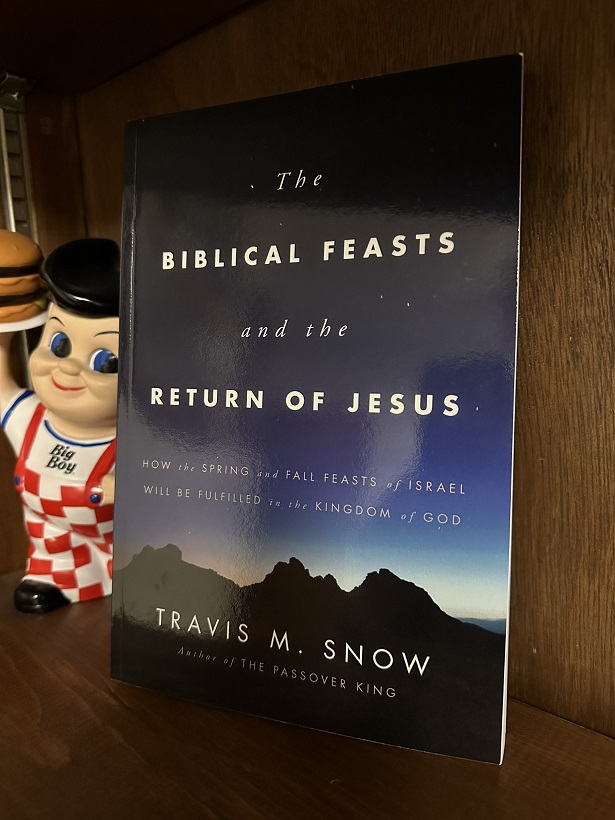
The Biblical Feasts and the Return of Jesus is the newest book by Travis M. Snow, author of The Passover King and The 70 Weeks Jubilee. Snow stated that The Biblical Feasts is “the first book ever written that explains how both the spring and fall feasts of Israel will be fulfilled after the Messiah’s Second Coming” (back cover). This is a bold claim; but I believe it’s one that is correct. That alone makes this work special. Many books have covered how the Spring feasts were fulfilled by the First Coming of the Messiah and how the Autumn feasts will be fulfilled by the Second Coming.
Snow’s principal thesis is that the feasts—particularly Passover, Weeks, Trumpets, the Day of Atonement, and Tabernacles—will be fulfilled by the events surrounding the Second Coming. This is despite the fact that Passover and Weeks are widely seen as being fulfilled by the First Coming alone.
Even before I read the first page, I was especially curious to see how Snow would deal with the seemingly overwhelming biblical evidence that Passover was fulfilled by the atoning death of Jesus on the cross. After all, if Snow couldn’t deal with the idea of Passover’s fulfillment at the First Coming, his argument would fall apart. Thankfully, Snow was quick to address this concern. And in doing so, he provided what I find to be a critical explanation:
Every feast carries [] multiple layers of meaning, and it is not until we grasp this basic point that we will be able to understand the full prophetic power and beauty of God’s appointed times. Ironically, many people who say Jesus already fulfilled the sprint feasts, and that only the fall feast away a future fulfillment, accept that He did fulfill certain aspects of the Day of Atonement (a fall feast) in the first century, particularly when he made atonement for our sins (11).
It’s hard to argue with Snow’s reasoning. I myself tend to think of the Spring and Autumn feasts being fulfilled by the First and Second Comings respectively. However, I also instinctively apply elements of the Autumn feasts to my understanding of the First Coming (e.g., Tabernacles applying to the incarnation of the Word, when He “tabernacled” among us [John 1:14]). The point is that the feasts often seem to, at the very least, apply to one coming even if they are fulfilled by another.
On that point, I prefer to think of a given feast as being fulfilled by one specific event associated with one of the two advents, while they may still apply to other events in the other advent. However, making a distinction between fulfilment and application vs. double or multiple fulfillments is such a minor distinction that it almost doesn’t make a difference in how one ultimately understands the multiple layers of prophetic meaning a feast has.
Some passages regarding the feasts and their place in the lunar calendar can be difficult for some to understand. But Snow’s explanations are both simple and convincing. Understanding how all the feasts, whether Spring or Autumn, are fulfilled or are applied to future events is vitally important for anyone who wishes to better understand a subject of supreme importance: the return of our Lord Jesus Christ. And I can honestly say, I don’t know of any work that explains that better than The Biblical Feasts and Return of Jesus. For those Christians who don’t know much about the feasts, regardless of their fulfillment, this book would be even more helpful to them.
The Biblical Feasts has an introductory chapter, followed by chapters on the historical contexts of the feasts alternating with chapters on how the feasts will be fulfilled by the return of Jesus. This was an excellent way to organize the information and the solid research that went into it. My personal favorite was the final chapter, The Feast of Tabernacles & the Return of Jesus. As you can imagine, Snow ties the feast directly to the Millennium. Get the book to see the fascinating way he summarizes Tabernacles’ importance at the end of the chapter!
Get your copy from Amazon.

I’ll have to take a look at the book of course, and thank you for making me aware of it, but I usually think of Passover as being fulfilled at the first coming and Atonement as being fulfilled by Zechariah 12:10 at the second coming. My thinking has been that, at least from the prophetic standpoint, to “mix these 2 feasts up” would nullify their being useful as a prophetic roadmap. Thanks for this post!
Yes, I can appreciate that.